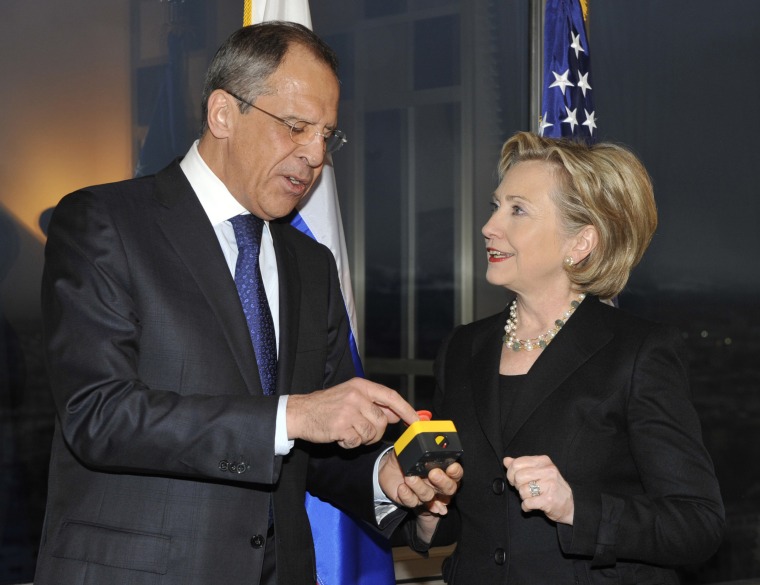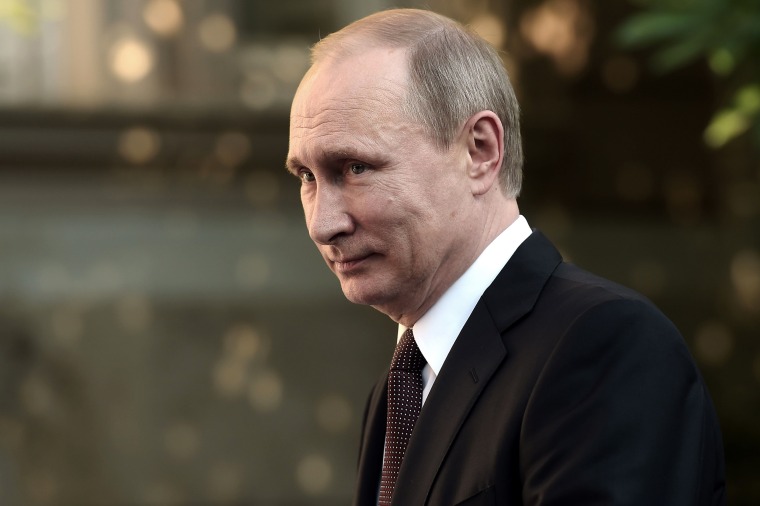Donald Trump has a clear answer when asked why he compliments Vladimir Putin: If he praises me, I'm going to praise him back.
But whether the Russian leader actually praised Trump — at least in the way the GOP nominee thinks — isn't quite as clear.
Related: Trump: Putin Praise Will Have 'Zero Impact'
In remarks last December, Putin used a Russian word for "brilliant" to describe Trump. Since then, Trump has repeatedly said Putin called him a "genius," and as recently as Wednesday evening during NBC's Commander-in-Chief Forum, Trump told Matt Lauer: "I think when he calls me 'brilliant,' I'll take the compliment."
"If he says great things about me, I'm going to say great things about him," Trump said.
There's just one problem: It appears something got lost in translation.
"Yarkii" (яркий), the word Putin used, does indeed mean "brilliant." But not in an intellectual sense, according to Russian experts.
"To a Russian ear, the general tone of Putin's phrase is complimentary, but not over the top."
"The word means someone who's bright, colorful. It means 'brilliant' if you're thinking about a bright light, but it's not 'brilliant' if you're thinking about someone's intelligence," Angela Stent, director of the Center for Eurasian, Russian and East European Studies at Georgetown University, told NBC News.
Putin's full sentence, according to Mikhail Gronas, chair of Dartmouth College's Russian department, translates to: "Well, he is a very bright person, talented without a doubt. But this is not our business to determine his merits, this is the business of the U.S. voters."
Had the Russian leader meant brilliant in terms of intelligence, he would have said "blestiashchii" (блестящий) instead of using "yarkii," which Russians use for light or colors, Gronas said.
"To a Russian ear, the general tone of Putin's phrase is complimentary, but not over the top," he told NBC News.
Related: Donald Trump and Vladimir Putin: Timeline of a Bad Bromance
Russians have some words with double meanings. For example, one word means both "peace" and "world," said Slava Paperno, director of Cornell University's Russian Language Program. But there's no question what Putin meant in this case, he said.
"This is not one of those ambiguous things in language," Paperno told NBC News. "Everybody knows in this word combination, 'yarkii' means something that has a lot of light and in this combination it is something that looks more interesting than something else."
Even the man in Moscow himself later clarified the remarks.
"I only said that he was a bright person," Putin told CNN's Fareed Zakaria in June. "Why do you always change the meaning of what I said?"
Trump wasn't the only one who mistook what Putin said. The Guardian newspaper published a video of Putin talking about Trump and initially headlined it as Putin calling Trump "bright and talented," only to later amend it to "colorful and talented."
The mistake is understandable, the experts said.
"Russian is a very complicated language," Stent said. "It's not an easy language to translate."
Errors can happen translating English into Russian, too. The most high-profile gaffe was in 2009, as the Obama administration was stressing the need to "press the reset button" on U.S.-Russian relations following Russia's invasion of the country of Georgia.
To underscore the point, then-Secretary of State Hillary Clinton met with Russian Foreign Minister Sergey Lavrov in Geneva and presented him with a small box wrapped in ribbon.

"I would like to present you with a little gift that represents what President Obama and Vice President Biden and I have been saying, and that is: We want to reset our relationship, and so we will do it together," Clinton told him.
Lavrov opened the box to find a red button with the word “peregruzka” printed on it.
"We worked hard to get the right Russian word [for 'reset']. Do you think we got it?" Clinton asked.
Lavrov, laughing, told her she hadn't.
“It should be 'perezagruzka,'" he said. "This says ‘peregruzka,’ which means ‘overcharged.’”

